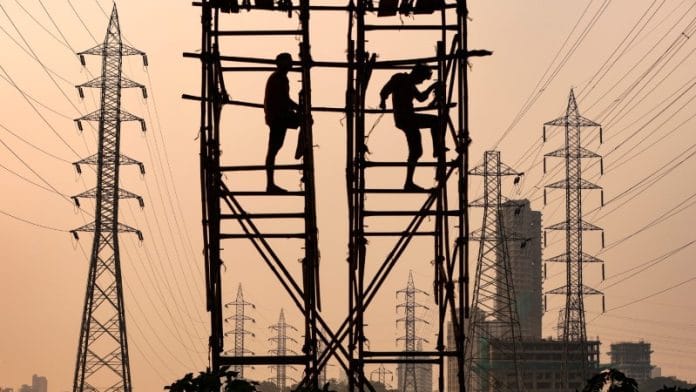New Delhi: A new amendment by the Ministry of Power could put significant pressure on Bangladesh and potentially benefit the Adani Group as well, an analysis by ThePrint has found.
The amendment in question, issued Monday, allows power-exporting companies to also sell within India in particular cases.
This is of particular significance because Bangladesh currently imports power only from India, of which the Adani Group’s Jharkhand plant provides the lion’s share. Further, this ultra super-critical thermal power plant in Godda, Jharkhand, is also the only one in India where 100 percent of its capacity is contractually tied to exports.
Local media had reported last year that Bangladesh authorities had written to the Adani Group to revise the power-purchase agreement, citing the allegedly high price of imported coal the company was using, which reflected in the price Adani charged Bangladesh.
All these factors led the Congress to attack the government for moving “with lightning speed” to help out the Adani Group in light of uncertainty amid the recent turmoil in Bangladesh. The company however has rebutted this charge, saying the amendments would not lead to any gains for it.
Power exporters can now sell within India
In 2018, the central government updated rules governing the export of electricity in India, called “Guidelines for Import/Export (Cross Border) of Electricity – 2018”. These rules were amended through an office memorandum issued Monday.
“Government of India may permit connection of such generating station to the Indian Grid (inter-State or intra-State grid) to facilitate sale of power within India in case of sustained non-scheduling of full or part capacity or default notice issued by the generator for any default including delayed payment under the PPA (Power Purchase Agreement),” the amendment said.
In other words, the government can now allow power exporting companies to connect their generation capacity to the Indian grid, in case the importing country does not import the full capacity of the generating plant for a sustained period, or defaults on or delays payment to the company.
‘Just an industry enabling universal provision,’ says Adani
After the amendment was made public, Congress leader Jairam Ramesh took to X, alleging this was done to benefit the Adani Group.
“The non-biological PM moves with lightning speed when the interests of his favourite tempowallah are involved,” Ramesh wrote on X. “Adani imports coal from Australia to generate power in Jharkhand and supply it to Bangladesh. It is the only company allowed to do so through a power purchase agreement which has been very controversial. Now the company has been permitted to sell that electricity in India itself.”
According to the latest data available with the Bangladesh Power Development Board, the country imported a total of 2,656 MW of power in 2022-23, all of which came from India. Of this, the Adani Group’s Godda plant supplied 1,496 MW, or 56 percent.
More than 10 percent of Bangladesh’s total power generation comes from India, providing India with a strategic advantage.
In fact, according to the Bangladesh Power Development Board (BPDB), the country is now looking to diversify its power imports. In its 2022-23 annual report released in January, the country said it would import 40 MW of power from Nepal from 2024 onwards, and an additional 500 MW from 2030. In addition, it said a further 683 MW of power from Nepal’s Sunkoshi-3 hydro plant was also “under planning”.
When contacted by ThePrint, the Adani Group said the amendments to the power-export guidelines were “just an industry enabling universal provision” to allow exporting power stations in India to connect with the Indian grid.
“This does not affect the existing Power Purchase Agreement (PPA) between Adani Power and Bangladesh Power Development Board (BPDB),” the Adani Group further said. “We have been providing uninterrupted power to Bangladesh from our Godda plant.”
“Adani Power is committed to fulfil contractual obligations as per BPDB’s demand schedule and provisions of PPA and would look forward to continuing reciprocal fulfilment by BPDB,” the spokesperson added.
The Adani Group added the amendments “in no way imposes any financial or other obligations on the Government of India or any gains to Adani Power”.
Adani agreement with Bangladesh
Adani Power Jharkhand Limited (APJL), a wholly-owned subsidiary of Adani Power, in 2017 signed a PPA with BPDB to supply 1,496 MW net capacity power from its Godda plant for a period of 25 years through a 400-kV dedicated transmission system connected to the Bangladesh grid.
In July 2023, after the full capacity of the Godda plant came online, Adani Group chairman Gautam Adani called on then Bangladesh Prime Minister Sheikh Hasina.
Following this meeting, the Adani Group in a statement confirmed the Godda plant was India’s first commissioned transnational power project where 100 percent of the generated power was supplied to another nation. No other such plant has come up since then.
Prior to this meeting, the United News of Bangladesh had reported that BPDB wrote to Adani Power seeking to revise the PPA signed between them. BPDB reportedly felt the price of coal imported by Adani Power to produce its electricity was too high.
This higher input price was factored into the price at which the Adani Group sold its electricity to Bangladesh.
It has been reported that the Godda power plant will source its coal from the Carmichael mine in Australia, which is owned and operated by Adani Mining.
In other words, the Bangladeshi media has alleged that Adani Power is paying a higher price for coal sourced from its own sister company, Adani Mining, and making Bangladesh foot the bill.
(Edited by Tikli Basu)
Also read: Bangladesh crisis may affect medical-tourism to India: CareEdge Ratings






